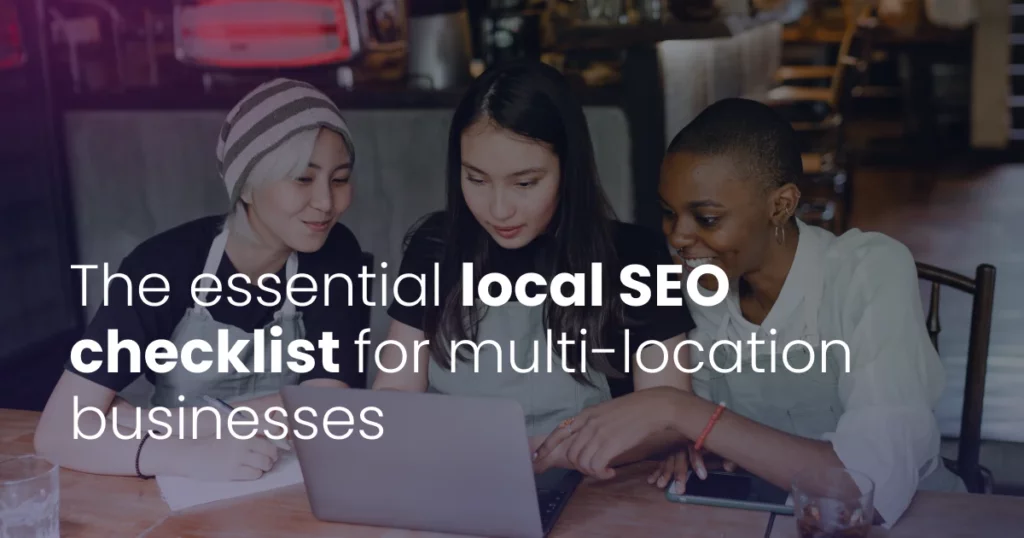
5 pro tips to scale SEO across multi-location businesses
Share
Schedule a 30-min marketing strategy call with our team
For multi-location businesses, having an effective SEO strategy across all locations can seem daunting. How can you scale SEO across multi-location businesses and optimize each location’s website while still maintaining brand consistency?
In this post, we’ll outline several pro tips to help multi-location brands improve local SEO and drive more traffic to each location’s website. As a software company that empowers local operators to easily run digital marketing campaigns, Evocalize understands the unique SEO challenges faced by businesses managing multiple locations.
By implementing location-specific optimization strategies, multi-location businesses can maximize SEO for each location while boosting overall brand awareness.
Let’s dive into these pro tips for optimizing local SEO across your brand’s locations.

Use location-specific pages and URLs
Having unique website pages and URLs for each location is vital for local SEO because it allows search engines to understand that each page represents a distinct physical location. Without this optimization, search engines may index all locations as one entity.
Why you need location pages
- Separate pages help search engines display your locations for relevant local searches. If you just list all locations on one page, you limit local discoverability.
- Unique URLs with geo-targets boost your rankings for searches containing that city, county, etc.
- Location pages allow you to customize titles, meta data, and content for each area’s population and search trends.
- Analytics on engagement for each page provides insights to improve optimization further.
Best practices
- Create a dedicated page for each brick-and-mortar location. Don’t lump all locations together.
- Include the city and state in each URL: www.brandname.com/city-state/
- Tailor page title and meta description for each page with location.
- Prominently display full address, phone, and hours for that specific branch.
- Link to all locations in the site footer for easy navigation.
- Drive traffic to location pages with Evocalize’s localized digital ads.
- Add events in Google Analytics to track engagement by location.
- Use schema markup (upcoming section) to optimize pages for local SEO.
With optimized location pages, multi-unit brands can improve local SEO while still maintaining a consistent brand experience across the website. Follow these best practices to boost discoverability and conversions for each location.
Create locally-optimized landing pages
In addition to general location website pages, brands should also create highly targeted landing pages that speak to each local audience. These are particularly helpful for location-based services like real estate, healthcare, and finance.
Location pages give an overview of each branch like address, hours, and main products. Landing pages are optimized for hyper-local keywords and intent for that area, plus better allow for A/B testing.
With localized landing pages that complement the location overview pages, multi-unit brands can go more in-depth on their expertise while tailoring messaging to each community. This improves both SEO and conversion rates.
How landing pages help
- Highly focused pages optimized for specific keywords and geo-targets.
- Can go in-depth on your local expertise, advantages, and unique value proposition.
- Allow A/B testing of different messages and offers by location.
Best practices
- Research terms and intent for each target location using keyword planners.
- Craft benefits-driven copy that resonates with local population needs.
- Include city/state prominently on the page for SEO.
- Develop different pages and offers for different neighborhoods.
- Use Evocalize to geo-target ads driving to each landing page.
- Continually test and optimize page content based on analytics.
Specialized landing pages complement your location website pages, going more in-depth on local expertise. Targeted landing pages allow brands to improve SEO while tailoring messaging to each community.
Implement local schema markup
Schema markup is code that helps search engines better understand the content and context of a web page. Implementing location-specific schema can optimize each location page for local SEO.
Why use schema markup
- Schema clearly identifies the page as representing a specific business location.
- It provides key details like business name, address, and geo coordinates.
- Pages with schema have a better chance of ranking in the local pack.
- Can result in a rich snippet with info like address, phone, and ratings.
Best practices
- Use schema.org standards and JSON-LD format.
- On each page, mark up the business name, street address, city, state, and zip code.
- Add geo latitude and longitude coordinates for mapping.
- For chains, identify the parent company name and each location’s branch name.
- Mark up key details like phone number, opening hours, and price range.
- Test markup with Google’s Structured Data Testing Tool.
- Monitor performance and tweak schema code to improve visibility.
Proper schema markup signals to search engines that each location page represents a distinct local business entity. Combined with optimized pages and URLs, schema helps multi-location brands improve local SEO and visibility across all locations.
Get listed on Google My Business
Google My Business listings are vital for local SEO and visibility in map searches. Each location needs its own verified listing.
Why claim local listings
- Appear in Google’s local pack map search results.
- Display key info like address, hours, photos, reviews.
- Link people searching locally to your location pages.
- Build local authority with more reviews, photos, and views.
Best practices
- Create a Google My Business account and claim existing listings.
- Verify listings by mail, phone, or in person for full functionality.
- Fill out complete business info and add photos for each location.
- Encourage customer reviews by email, receipt, and in-store signs.
- Respond publicly to reviews to increase engagement.
- Use a tool like Ovation to collect reviews and review patterns.
- Check listings regularly for changes or inconsistent info across locations.
As you scale, you can empower local teams to help manage their Google My Business listing. Here are some tips:
- Provide training for location managers on managing Google My Business.
- Give editable access to local staff so they can update listings.
- Set guidelines for imagery and branding across listings.
- Let locations highlight local menu items/offers in the description.
- Incentivize staff to get more reviews by offering perks or contests.
Verified and optimized Google My Business listings are key for driving local traffic. Maintaining strong profiles for each branch ensures maximum visibility and discovery across the brand’s locations.
Produce locally-focused content
Creating locally-focused content like blog posts and social media can be a powerful way to boost SEO and engagement for each location. While on-page optimizations are important, content helps demonstrate your brand’s real connection to each community.
Benefits of local content
- Shows your location is an active part of the community.
- Caters to what each area cares about and searches for.
- Improves awareness and goodwill in each market.
- Can be used across platforms – website, social, and local publications.
Best practices
- Interview location managers to identify topics and events relevant for each area.
- Write blog and social posts about local happenings, news, and partnerships.
- Produce monthly roundups highlighting that branch’s sales, products, or charitable efforts.
- Share local team member spotlights or customer success stories.
- Have location staff engage with their communities on social media.
- Use Evocalize to promote content through geo-targeted ads.
Empower local teams
- Provide staff training on content best practices while giving creative freedom.
- Incentivize location teams to produce quality local content with rewards.
- Let staff suggest and create their own content ideas to ensure relevance.
- Feature user-generated content from happy local customers.
To learn more about the power of personal branding, check out this podcast episode with the SVP of Marketing at Kind Lending.
Engaging, useful content tailored to each location establishes your brand as a valued local partner while driving SEO. Location teams often have the best insights into what resonates in their communities. Empower them to optimize content for each market with training and support.
Scale SEO across multi-location businesses
At first it may seem challenging to scale SEO across multi-location businesses may seem challenging, but implementing these proven tips can make a major impact. The key is tailoring optimization strategies to match local search intent while still maintaining consistency across your brand locations. Just take it step-by-step!
Regional relevance and national consistency – you can achieve both with the right local SEO strategies for multi-location businesses.
Check out the local SEO checklist for multi-location businesses.

Share
Subscribe to our blog
Don’t miss a beat in the fast-changing local digital marketing landscape — sign up to stay ahead of the curve!






